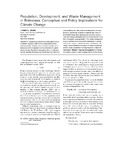Please use this identifier to cite or link to this item:
http://hdl.handle.net/10311/478| Title: | Population, development, and waste management in Botswana: Conceptual and policy implications for climate change |
| Authors: | Gwebu, T.D. |
| Keywords: | Botswana Waste management Greenhouse gas emissions Climate change |
| Issue Date: | 2003 |
| Publisher: | Springer http://www.springerlink.com/index/3NU5AFH2F999FM9P.pdf - |
| Citation: | Gwebu, T.D. (2003) Population, development, and waste management in Botswana: Conceptual and policy implications for climate change, Environmental Management, Vol. 31, no. 3, pp.348-354 |
| Abstract: | Based on government and other relevant documentation, this paper explores the conceptual linkage between population, development, and waste management in Botswana and the implications of this relationship for global climate change. Population is increasing, albeit at a decreasing rate. Spatially, the population is becoming more and more concentrated as the rates and level of urbanization increase. Economic growth has remained consistently high. The combined effect of population dynamics and economic development are having a noticeable imprint on the environment in the form of increased waste generation. Poor waste management poses a real threat to environmental sustainability in general and climate change in particular because of inadequate technology, weak institutional mechanisms to enforce regulations, and low levels of sensitization among the public to deal with the problem. Mitigation measures are suggested to minimize the negative effects of waste management on climate change. |
| URI: | http://hdl.handle.net/10311/478 |
| ISSN: | 0364 152x |
| Appears in Collections: | Research articles (Dept of Environmental Science) |
Files in This Item:
| File | Description | Size | Format | |
|---|---|---|---|---|
| Gwebu_EM_2003.pdf | Main article | 449.1 kB | Adobe PDF |  View/Open |
Items in DSpace are protected by copyright, with all rights reserved, unless otherwise indicated.
